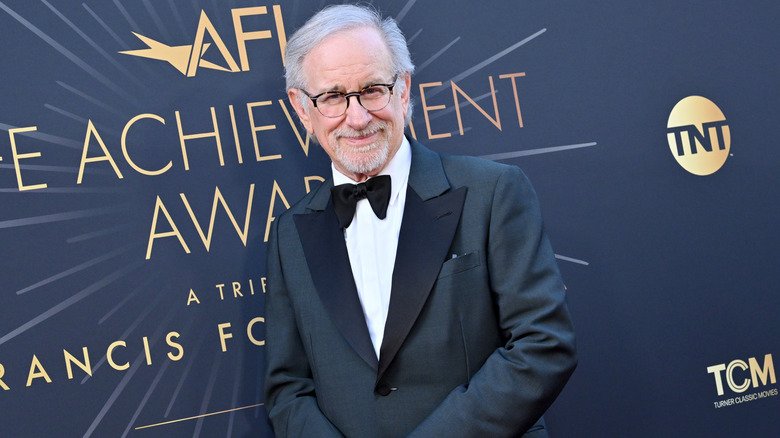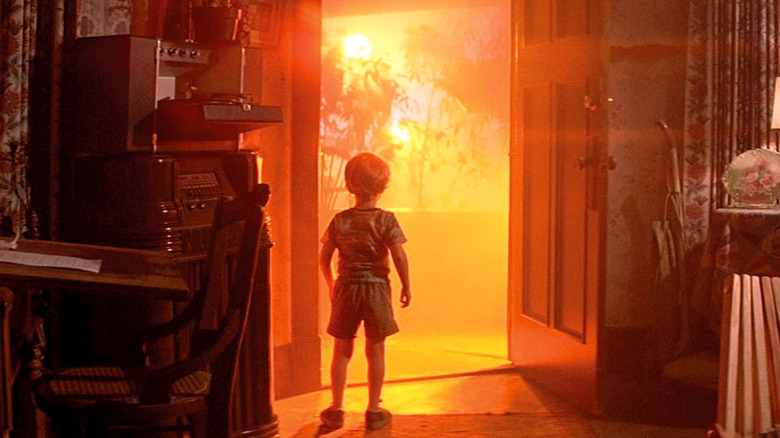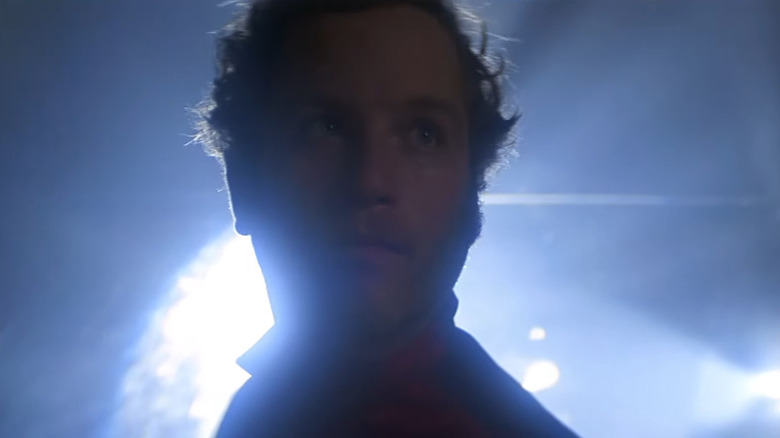Steven Spielberg's First Sci-Fi Movie Ever Is Impossible To Watch Today
Whether it be a Palme d'Or, an Academy Award, or even an induction into the Criterion Collection, there are all sorts of honors that can be bestowed upon a popular filmmaker. One of the smaller, yet significant, ones is your last name becoming a lexicon among the general public. Hitchcock, Kubrick, Lynch, Scorsese, Wachowski, and Kurosawa (take your pick) are but a few of many names that immediately conjure images of their cinematic trademarks. In terms of instant recognizability, few hold the industry-wide prestige of Steven Spielberg. The influential filmmaker is not only responsible in forming the template of contemporary blockbusters countless times over ("Jaws"), but has ingrained himself into all sectors of the entertainment industry. But of course, it takes time to achieve that kind of notoriety.
Spielberg had to do what just about every other aspiring filmmaker went through, and he built his credibility from the ground up. Short films are often a great way to get eyeballs on what you can do with such a minimal budget, as is the case with 1968's "Amblin." The dialogue-free love story about a pair of young drifters caught the attention of Sid Sheinberg, the former head of Universal, and it's what ultimately led to the then-22-year-old nabbing a contract with the studio. It was in the world of television where Spielberg would get to experiment and stretch his directing chops with one of the first episodes of "Columbo" and a "trial by fire" gig for his segment in the pilot movie of Rod Serling's "Night Gallery."
1971's "Duel," the television movie that followed an anxious salesman being chased by a shrouded figure in a tank truck, transcended its televisual medium and instilled confidence in Universal that Spielberg was a filmmaker destined for greater things. Look at where we are over five decades later to see the industry-wide results. But while "Duel" is often credited as Spielberg's first feature-length film, it's only true in the sense that it's his most readily available feature debut.
Firelight was Steven Spielberg's true first feature-length film
The drive to make movies had been ingrained in Steven Spielberg ever since his folks took him to see "The Greatest Show on Earth" when he was just 6 years old. He even made a whole fictional recounting about it just a few years ago in "The Fabelmans," a film that's made certain familial elements within his oeuvre very interesting to recontextualize. Spielberg would grow an affinity for the medium, prompting him to make his own home movies across his teenage years. His first short, "The Last Gun," even led to him earning a merit badge in the Boy Scouts. About five years later, the aspiring filmmaker would set out to make his first feature, "Firelight," at 17 years old.
The science-fiction directorial debut was shot during weekends, in which Spielberg's friends, family, and high school classmates participated in its creation. "Firelight" followed a group of scientists investigating strange lights in the sky, as well as a slew of disappearances all around the town of Freeport, Arizona. The 2-hour-and-15-minute student film only screened once at the Phoenix Little Theatre on March 24, 1964, where it made a hefty $1 profit on a budget of $500. Tickets were sold at $1 per ticket, and one person seemed to have paid an extra dollar to push the box office over the edge at $501. If only young Spielberg knew at that moment he would grow up to rake in billions worldwide.
Being inside that theater feels like one of those "you just had to be there" moments in film history, not just because you would have received an early glimpse of a director who would become such a titanic filmmaking legend, but because that auditorium contained the only people who have seen "Firelight" as a completed feature from start to finish. Spielberg had lent some reels of the film to a Los Angeles production company to show off what he could do, but when they went bankrupt, they disappeared, as did his footage. There's maybe about three minutes of readily available footage floating around online as of this moment.
For cinephiles intent on seeing every corner of their favorite filmmakers, it must be maddening to have this one blind spot. Although, I'm sure anyone who's ever made a student film isn't exactly jumping at the gun to make them readily available so everyone can point out flaws you've already thought about 10 times over. I have a DVD of my short films from high school and college that the internet will never see (there's one floating around online, but you've gotta find it first).
With that said, "Firelight" is a fascinating curiosity. It not only acted as a stepping stone to projects like "'Amblin" and "Duel," but was also one of the key inspirations for a later film of his that would become one of the best pieces of science-fiction ever made.
Firelight inspired Steven Spielberg to make Close Encounters of the Third Kind
Steven Spielberg has always been a genre-flexible director, but a lot of his work has been rooted in a fascination with aliens. Films like "E.T. The Extra-Terrestrial," "War of the Worlds," and "Indiana Jones and the Kingdom of the Crystal Skull" (even if its inclusion is mostly due to George Lucas) are in many ways the result of "Firelight." You may notice a very important entry missing here, and that's no accident. The 1964 student film was Spielberg's inspirational tether to "Close Encounters of the Third Kind."
In the 1977 movie, the planet is thrown into a collective of awe and fear when signs of intelligent life from beyond the stars begin making themselves explicitly known by way of UFO sightings. Whereas "Firelight" appeared to have taken on a more menacing bent regarding the abductions, their purpose in "Close Encounters" is left to conjecture. It's assumed that they were more out of curiosity than malice, as the aliens end up returning the people they took upon making first contact with humanity at Devil's Tower. In "Firelight," the extraterrestrials are revealed to be intergalactic space traffickers gathering specimens for a human zoo back on their home planet. We never quite see the fate of Richard Dreyfuss' Roy Neary once he boards the mothership, but John Williams' sweeping score gives the impression of a happy ending, even if it's one Spielberg feels differently about since becoming a father.
Spielberg's fascination with aliens may have taken a back burner to projects such as "West Side Story" and "The Fabelmans," but has in no way disappeared. Ever since 2024, the celebrated filmmaker had been planning a film about UFOs, with Emily Blunt, Colman Domingo, and Wyatt Russell having joined the cast. The latest update came from "Jurassic Park" screenwriter David Koepp, who had been tapped to write the currently untitled sci-fi project, claiming in June 2025 that filming had wrapped up a few weeks prior.
As we come to learn more about what the film is actually about, it wouldn't be too surprising to learn more tidbits about the making of "Firelight." The craziest outcome of this whole thing would be if it ended up being a remake of his lost first feature. Now that would be out of this world.


